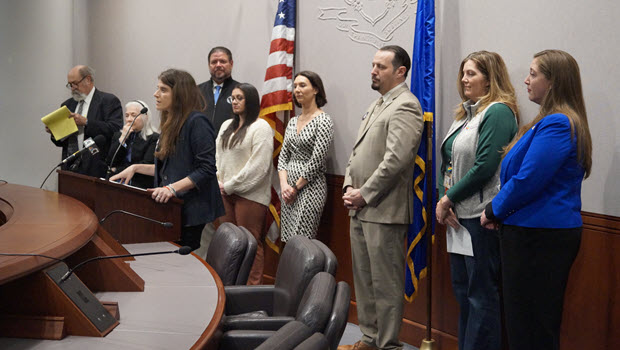Making facility improvements to ensure better air quality in schools can be prohibitively expensive, which is why a bill before the legislature that would allow schools to apply for state bonding to cover the cost of those upgrades is so essential.
To mark National Healthy Schools Week, legislators and members of the Connecticut Working Group on School Indoor Air Quality hosted a news conference today to urge the passage of HB 6922, a bill that emphasizes the importance of maintaining clean air and ensuring local districts meet IAQ safety standards, especially in light of looming federal funding cuts.
Education Committee Chair Rep. Jennifer Leeper said that the cost of air quality improvements has kept many schools from being able to provide a healthy environment for students and staff.
“Poor indoor air quality impacts our children’s ability to learn, it impacts our teachers’ ability to educate and has led to folks being permanently disabled because of unhealthy air quality in our schools. This isn’t just about air conditioning. It’s really about the health and well-being of everybody who enters our schools every day,” she said.
“Our teaching environments are our students’ learning environments, and it should not be a new idea or a secret that healthy physical environments lead to healthy academic environments,” said CEA Vice President Joslyn DeLancey. “If our students are unhealthy and our conditions aren’t safe, our students aren’t learning at the level that they’re supposed to be learning at. I’m so proud to be in Connecticut because over my tenure here at CEA, I’ve seen our legislature do right by our public schools when it comes to supporting and investing in healthy indoor air quality for our students, our teachers, our paraprofessionals, and other service providers and workers.”
Currently towns can apply for state bond funding to make a number of different types of improvements to school buildings, but not to upgrade heating, ventilation, air conditioning systems, or make other improvements to indoor air quality. This bill would change that.
School indoor air quality has been an important priority for the Education Committee since 2022, when it passed the first major update to the state’s IAQ statutes in almost 20 years. This included establishment of a school HVAC grant program under the Department of Administrative Services to reimburse boards of education for eligible costs related to school HVAC upgrades and replacement.
After two rounds of grant funding, 163 reimbursement grants were awarded to more than 60 school districts, for a total of over $178 million in state grants to municipalities.
“This grant program was a critical step forward in providing cities and towns with urgently needed funds to support healthy school IAQ at a time when available local funding for school HVAC projects was limited and varied significantly from town-to-town,” says CEA Legislative Coordinator Louis Rosado Burch. “While this came as a tremendous and welcome investment at the time, we know that there is still much work to be done to ensure healthy schools for all. Eligibility for these funds must be based on need and not be contingent on some lengthy, overly complicated application process. This grant program must be tailored to give priority to the districts that need it the most.”
According to the Department of Public Heath, one out of every four students have allergies and approximately 12% have asthma, said Senator Saud Anwar, a pulmonologist and chair of the legislature’s Public Health Committee.
“When you put these students in a building where the air movement is poor, where the ventilation is poor, where the temperature control is not good, and where the mold and the dust is not getting cleaned up, it’s a perfect storm. And we have seen this perfect storm for our children and our teachers, where the ability to focus and the ability to function decrease, while absenteeism increases. This is one of the common causes of absenteeism,” he said.
Anwar said that HB 6922 will help the state to identify and improve buildings with heating, cooling, and ventilation systems in urgent need of repair or replacement.
“If you had a magic wand, we’d have new buildings, but we don’t have that. Until that time this is the best solution so that we can actually get all of our students and our teachers healthy. This is something that is not a priority. This is an absolute necessity,” he said.
“If we’re not improving our systems the problem is just going to get more and more expensive,” DeLancey said. “If we have to continue to repair outdated systems, close schools for extreme temperatures—all of those things come at a cost, and long term they’re problematic. We need to have a commitment from everybody involved to support this process and this work because we need healthy schools so our students can thrive, and our employees can feel safe and protected and do the work that they need to do.”







